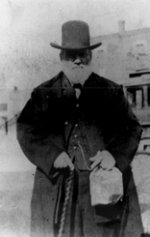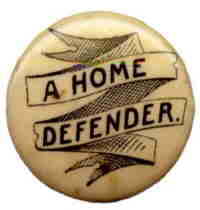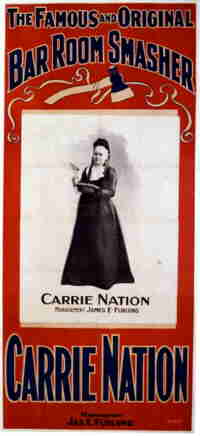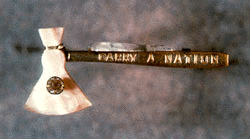 SKC Films Library SKC Films Library |
|
|
| SKC Films Library >> Sociology >> Social Pathology
>> Alcoholism |
| Carry Nation temperance advocate known for smashing bars
Carry Amelia Moore was born on November 25, 1846, in Garrard County, Kentucky. Her family moved several times before settling in Cass County, Missouri. In 1867, Carry married Dr. Charles Gloyd. Unfortunately, he was a heavy drinker. The marriage produced a sickly daughter, Charlien, whose condition Carry blamed on her husband's drinking. She left him soon after Charlien's birth because of his alcoholism and inability to earn a steady living; he died six months later. To support both herself and her daughter, she taught school and rented rooms. In 1877, Carry married David Nation, a lawyer and minister who was 19 years her senior. The couple spent the first years of their marriage in Texas, where David often had difficulty holding a steady job. They moved to Medicine Lodge, Kansas, in 1889, where he became pastor of the Christian Church. Carry taught Sunday School at her husband's church, provided assistance to poor people, became a jail evangelist, and helped establish a local chapter of the Women's Christian Temperance Union. A very religious woman, Nation often claimed to have visions. She also believed that she was divinely protected, a belief that intensified after a fire in 1889 that burned much of her hometown down but left her hotel untouched. David Nation Although an 1880 state law forbade the sale of liquor in Kansas, the law was not well enforced. Taking it upon herself to see to it that temperance laws were fully enforced, Nation began a campaign to close the saloons in Medicine Lodge. She began by praying in front of saloons, but when praying failed she began resorting to physical attacks. She struck her first saloon on June 1, 1900, using rocks, bricks and other objects. After successfully ending liquor sales in Medicine Lodge she began taking on the saloons of other Kansas cities. In Kiowa, she used rocks and brickbats to smash three establishments. On December 27, 1900, she destroyed the bar in Wichita's Carey Hotel, then one of the finest in the state; it was here that she began using her trademark hatchet. Next she traveled to Enterprise at the invitation of a leading citizen, where she spent two riotous days. On January 26, 1901, she showed up in Topeka for the annual convention of the Kansas State Temperance Union, despite having been deliberately overlooked by the convention organizers. After the convention she organized several hundred women (and a few men) into bands of "Home Defenders." Nation and her followers spent the next three weeks attacking Topeka saloons and gambling establishments. "A Home Defender" button After finally succeeding in her efforts to get Kansas to enforce its prohibition laws, Nation agreed to embark on a national tour. While often enthusiastically received by fellow temperance advocates, her habit of attacking saloons in states where liquor sales were legal got her arrested several times. Sales of pewter hatchet pins and "Home Defender" buttons helped pay her fines, as did the fees she collected during her speaking engagements. Although many people considered her intolerant, she impressed many others with her sincerity and courage. An eloquent speaker, she also adamantly opposed tobacco and immodesty in women's dress. David Nation was not one of Carry's fans, however, and divorced her on grounds of desertion in 1901. poster advertising one of Nation's
speaking engagements pewter hatchet pin Nation called Topeka home until 1905, when she moved to Oklahoma Territory and helped that state enter the nation with a dry constitution. Following an extensive European tour in 1908-09, she lived briefly in Washington, D.C. Failing health forced her to end her speaking tour in 1910, after which she purchased property in Eureka Springs, Arkansas, on which she intended to open a school of prohibition. She never had a chance to get the school going, however, as she collapsed in January 1911 while giving what would be her last oration. She died dirt poor in Leavenworth, Kansas, on June 11, 1911, and was buried in Belton. SOURCES SEEALSO |
SKC Films Library >> Sociology >> Social Pathology >> Alcoholism This page was last updated on February 07, 2017. |




